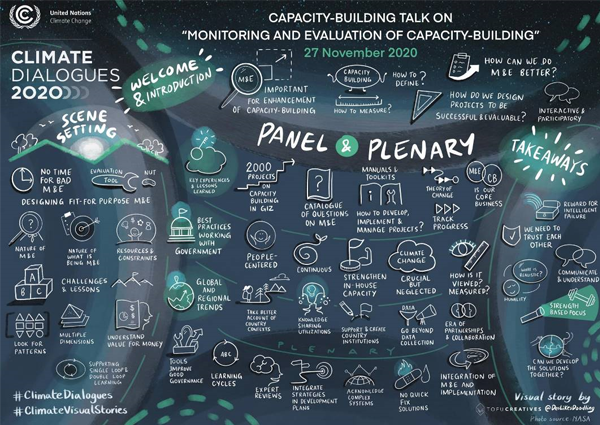Key takeaways from the “Climate Dialogue 2020: Monitoring and Evaluation Capacity Building”
“Capacity building” is fundamental to achieving the Paris Agreement and has been identified as a priority in countries’ nationally determined contributions (NDCs). It is also a key issue in various activities undertaken under the United Nations Framework Convention on Climate Change (UNFCCC). To enhance the effectiveness of capacity-building efforts related on climate change, implementation activities aimed at capacity-building need to be properly monitored and evaluated. Monitoring of capacity-building projects is essential to their success and through well-planned and suitable monitoring and evaluation (M&E) practices, efficient allocation of resources and increased effectiveness can be better ensured.
The virtual talk on “Monitoring and Evaluation Capacity Building” was the part of the UN Climate Change Dialogues 2020, or Climate Dialogue, has held online on November 27, 2020 by the UNFCCC secretariat to facilitate discussion and provision of information among actors and stakeholders involved in climate capacity-building. These talks will offer a space to exchange knowledge and share best practices, including with a view to strengthening the focus of and work on capacity-building.
In the panel discussion, the ‘designing fit-for-purpose monitoring and evaluation were presented:
- Nature of the monitoring and evaluation including the primary intended users, primary intended users-learning, accountability, signaling, timing of monitoring and evaluation compared to implementation (before, during, afterwards) and types of key evaluation questions being asked
- Nature of what is being monitored and evaluated including, how well understood and predictable intended results and how to achieve them, multiple actors contributing to results, effect of context on activities and results, time-lag before results evident, and Visibility of activities and results
- Resources and constraints for example: quantity, quality and relevance of existing data, Internal time, funding to engage external support, goodwill and support of key stakeholders, barriers to travel and engagement
In addition, the issues that are discussed together were lessons learnt and challenges that need to be addressed, for example there are questions about the capacity development that developing countries need to take into account, such as the definition of the term, what has been done under UNFCCC? Are there any other initiatives? And what are the key gaps in current efforts?
Moreover, there were consensus in the seminar such as monitoring and evaluation should be taken better account of country contexts, taking advantage of sharing experiences and knowledge utilization, support and create country institutions, go beyond data collection, this is the era of partnerships and collaboration. And most importantly we need to trust each other.
Reference
https://unfccc.int/event/capacity-building-talk-on-monitoring-and-evaluation-of-capacity-building




